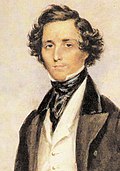Wikipedia:Today's featured article/requests/Felix Mendelssohn
Felix Mendelssohn
[edit]- This is the archived discussion of the TFAR nomination for the article below. Subsequent comments should be made on the appropriate discussion page (such as Wikipedia talk:Today's featured article/requests). Please do not modify this page.
The result was: scheduled for Wikipedia:Today's featured article/February 3, 2019 by Ealdgyth - Talk 16:11, 26 January 2019 (UTC)
Felix Mendelssohn (3 February 1809 – 4 November 1847) was a German composer, pianist, organist and conductor of the early romantic period, who wrote symphonies, concertos, oratorios, piano music and chamber music. His best-known works include his Overture and incidental music for A Midsummer Night's Dream, the Italian Symphony, his mature Violin Concerto, his String Octet, and his Songs Without Words for solo piano. A grandson of the philosopher Moses Mendelssohn, he was born into a prominent Jewish family in Berlin, baptised as a Reformed Christian at age seven, and recognised early as a musical prodigy. Mendelssohn revived interest in Bach's music, notably with a performance of the St Matthew Passion in 1829. Mendelssohn enjoyed success not only in Germany, but became well received in his travels throughout Europe as a composer, conductor and soloist, including ten visits to Britain during which many of his major works were premiered. The Leipzig Conservatoire, which he founded, became a bastion of his rather conservative taste. After a long period of relative denigration, he is among the most popular romantic composers. (Full article...)
- Most recent similar article(s): no classical composer for the last 3 months
- Main editors: Smerus
- Promoted: Jan 2018
- Reasons for nomination: birthday (210)
- Support as nominator. Gerda Arendt (talk) 12:30, 17 December 2018 (UTC)
- Support as main editor - a nice birthday present for Felix, thanks for thinking of this, Gerda.--Smerus (talk) 17:04, 17 December 2018 (UTC)
- Support as the date makes sense and should hopefully draw more attention to him and the article. Aoba47 (talk) 23:16, 27 December 2018 (UTC)
- Support - we haven't had any classical music composers for some time, birthday looks like a good date. L293D (☎ • ✎) 21:31, 18 January 2019 (UTC)

